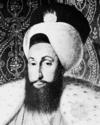- Selim III
-
born Dec. 24, 1761, Constantinople, Ottoman Empiredied July 29, 1808, ConstantinopleOttoman sultan (r. 1789–1807).He inherited the throne during a losing war with Austria and Russia (1787–92), with whom he later signed treaties. Napoleon I's invasion of Egypt in 1798 drove him into an alliance with Britain and Russia, but, impressed with Napoleon's successes, he switched sides in 1806. At home he attempted tax and land reform and established a European-style military corps, but, unable to enforce his reforms in the face of mutinies among the Janissaries and other units, he rescinded them. He was promptly overthrown and was strangled on the orders of his successor, Mustafa IV.
 Selim III, detail of a portrait by H. Berteaux, early 19th century; in the Topkapı Palace ...Sonia Halliday
Selim III, detail of a portrait by H. Berteaux, early 19th century; in the Topkapı Palace ...Sonia Halliday* * *
▪ Ottoman sultanborn Dec. 24, 1761, Constantinople, Ottoman Empire [now Istanbul, Turkey]died July 29, 1808, ConstantinopleOttoman sultan from 1789 to 1807, who undertook a program of Westernization and whose reign felt the intellectual and political ferment created by the French Revolution.A poet and an accomplished composer of Ottoman classical music, Selim had enjoyed greater freedom prior to his accession than the Ottoman princes before him. Influenced by his father, Mustafa III (reigned 1757–74), Selim had acquired a zeal for reform.When Selim succeeded his uncle Abdülhamid I (April 7, 1789), he attempted to end the social, economic, and administrative chaos facing the empire. He set up a committee of reformers (1792–93) and promulgated a series of new regulations collectively known as the nizam-ı cedid (“new order”). These included reforms of provincial governorships, taxation, and land tenure. More significant were his military reforms: in addition to new military and naval schools, he founded new corps of infantry trained and equipped along European lines and financed by revenues from forfeited and escheated fiefs and by taxes on liquor, tobacco, and coffee. Finally, to provide for direct contact with the West, Ottoman embassies were opened in the major European capitals.Selim, who came to the throne during a war (1787–92) with Austria and Russia, was compelled to conclude the treaties of Sistova (Svishtov; 1791) with Austria and of Jassy (1792) with Russia. In 1798 Napoleon's invasion of Egypt drove Selim into alliance with Great Britain and Russia. After the French evacuated Egypt (1801), Selim, dazzled by Napoleon's successes in Europe, not only recognized him as emperor (1804) but also, under the influence of General Sébastiani, Napoleon's ambassador in Constantinople, declared war (1806) on Russia and Great Britain.Selim's reorganizations and the increasing influence of France evoked a strong reaction from the conservative coalition of the Janissaries, the ulama (men of religious learning), and others adversely affected by the reforms. Selim, on the other hand, lacked the determination to enforce the measures. In 1805, when he ordered the reorganization of troops in the Balkan provinces, the Janissaries (Janissary) mutinied in Edirne (in Thracian Turkey) and were joined by the ayan (aynʿ) (local notables), who hitherto had supported the sultan. Selim halted the reorganization and dismissed his reformist advisers. Finally, in 1807, a mutiny of the yamaks (auxiliary levies) compelled Selim to abolish the nizam-ı cedid reforms and culminated in his imprisonment. In the ensuing months of confusion, the reformists rallied around Bayrakdar Mustafa, pasha of Rusçuk (now Ruse, Bulg.), who marched to Constantinople to restore Selim. Bayrakdar took the city, but in the meantime Selim had been strangled on orders from his successor, Mustafa IV.* * *
Universalium. 2010.
